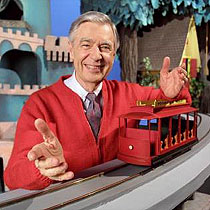In the halls of recovery and in my daily work I deal a lot with anonymity. People hide behind it for good and bad reasons. This is where I separate the honorable folks from the cowards.
Mood music (Click the “Watch it on Youtube” link. It’s worth it):
[youtube http://www.youtube.com/watch?v=mxMHtjQW6ZQ&fs=1&hl=en_US&rel=0]
I’ve met a lot of inspirational people who prefer to keep their identities hidden with good reason.
In the 12-Step program I embraced to overcome a blistering binge-eating addiction, anonymity is considered a vital tool of recovery. We know each other by first names and home towns, mostly. That’s so people in these meetings can share openly and let out all the pain and confusion they feel, which is an important step toward setting things right. They can do so without fear of being outed in their circle of friends and relatives and in their work places.
To blow someone’s anonymity under those circumstances is a terrible thing to do. I regularly share my 12-Step experiences here, but I made a choice to take a chance and out myself. Nobody gets put at risk except for me. Thankfully, everything turned out fine and I get a ton of support from the people in my personal and professional lives.
I often write about my 12-Step experiences here, but I never name names unless I’ve gotten someone’s permission. Even with permission, I usually leave names out.
In my professional life I deal with a slightly different kind of anonymity. I often get important information from people who would get fired or jailed for talking to me, so their identities are hidden for their own safety. I allow a source their anonymity when they give a valid reason for requesting it. I recently interviewed an Iranian computer programmer who fled to Europe after the government pressured him to use his talents as part of their quest to build a cyber army. To name him would put him in real danger. Usually, though, the anonymity is usually honored because someone with valuable information would be blackballed in the industry for sharing it.
Then there’s the bad anonymity, the kind that applies to the verbal bomb throwers.
Some people like to hurl insults and question someone’s character without being called on the carpet in return. So they leave an anonymous comment on one of my sites and resort to name-calling and whining.
I’ve dealt with this sort plenty in my 17 years as a writer and editor. They usually don’t bother me. They come with the territory, and I have a pretty thick skin at this point. And more often than not, the insults are wrapped around constructive criticism I fine useful.
But I’ll admit it: My tolerance goes through the floor when someone decides to be an outright asshole.
Yesterday was one of those times. I was checking my Twitter stream and found the following tweet by someone hiding behind an anonymous profile called the InfoSecDropBox:
“OMG, I’m @BillBrenner70, I’m fucked up and have to keep telling you how fucked up I am. LOOK AT ME! LOOK AT ME! I’M A BLOGGER!”
The profile looked like it had just been set up yesterday and, when I checked it this morning, the last tweet said “Alright, alright. Enough.”
I should correct this person on one point: I don’t consider myself a fuck-up. I used to be one, but not anymore. Oh, I still screw up in spectacular fashion on a regular basis, but that doesn’t make me a fuck-up. It makes me human. Every one of us has struggles to contend with.
I reached a point where I found my equilibrium and chose to write about how I used to be, why I’m the way I am today and where the ongoing struggles are. I do it because there’s a stigma around the kind of struggles I’ve had and I decided to take a crack at breaking them down so people who are now dealing with what I once dealt with will know it’s OK and that they can turn it around.
I knew I’d face some criticism. I knew some people would misunderstand what the blog is about. But I felt it was worth it, and it has been.
I don’t mind the bomb throwers. But when they’re too scared to show themselves, they are cowards and I can’t take them seriously.
My name is out there for people to rip away at if they choose, and that’s fine.
But if you need to be anonymous, I have to wonder:
Are you so insecure about your own character that you’re too terrified to face the people you don’t understand and ask the hard questions out in the open like a grown-up? 
Since I don’t know who you are, I have to assume so.
By the way: If you see the posts that annoy you, that can only mean you’re following me on Twitter or we’re connected on Facebook or LinkedIn.
I suggest you un-follow or un-friend me.
The solution is as simple as that.
If you insist on maintaining the connection with me anyway, despite you’re distaste for what I do, that just makes you an idiot.



 I’ve been there. Migraines. Brutal back pain. A stomach turned inside-out.
I’ve been there. Migraines. Brutal back pain. A stomach turned inside-out.